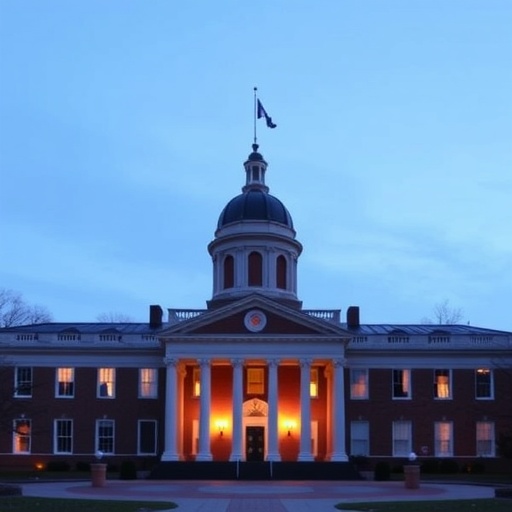In a striking display of institutional independence, the University of Virginia (UVA) has officially declined to join the Trump Administration’s ‘Compact for Academic Excellence,’ signaling deepening rifts between federal policymakers and the nation’s higher education leaders. This decision, announced late yesterday by UVA‘s Board of Visitors, underscores growing concerns over perceived government interference in university curricula and research priorities.
- Decoding the Compact: Core Mandates and Controversial Provisions
- UVA’s Principled Rejection: Leadership Voices and Internal Deliberations
- National Echoes: Other Universities Joining UVA’s Resistance
- Federal Funding at Stake: Economic Impacts and Policy Shifts
- Looking Ahead: Pathways for UVA and the Future of Academic Governance
The rejection comes at a time when the Trump Administration has intensified efforts to align academic institutions with its vision of educational reform, tying federal funding to compliance with the compact’s guidelines. UVA, a flagship public university founded by Thomas Jefferson, emphasized that participation would compromise its commitment to unfettered intellectual inquiry and diverse scholarly pursuits.
Decoding the Compact: Core Mandates and Controversial Provisions
The ‘Compact for Academic Excellence,’ launched by the Trump Administration’s Department of Education in early 2020, aims to elevate standards in American higher education by promoting what officials describe as ‘patriotic scholarship’ and ‘practical skills development.’ At its heart, the initiative requires participating institutions to integrate specific course modules on American history, civics, and economic principles aligned with free-market ideologies. Proponents argue it addresses a perceived liberal bias in academia, citing surveys from the Foundation for Individual Rights in Education (FIRE) that show over 60% of professors self-identify as left-leaning.
Key provisions include mandatory reporting on ‘viewpoint diversity’ in faculty hiring, with institutions receiving bonus federal grants—up to $50 million annually—for demonstrating balanced ideological representation. The compact also mandates reviews of diversity, equity, and inclusion (DEI) programs to ensure they do not ‘undermine merit-based admissions.’ Critics, however, decry it as a Trojan horse for censorship, pointing to language that could penalize research on topics like climate change or social justice if deemed insufficiently ‘balanced.’
According to a leaked internal memo from the Department of Education, the compact has already secured commitments from over 200 smaller colleges and conservative-leaning institutions, such as Liberty University and Hillsdale College. Yet, for elite public universities like UVA, the stakes are higher, with annual federal research funding exceeding $300 million at risk. UVA’s rejection letter, signed by Rector William H. Goodwin Jr., stated: ‘We cannot, in good conscience, trade our foundational principles of academic freedom for conditional federal support.’
UVA’s Principled Rejection: Leadership Voices and Internal Deliberations
UVA’s decision was not made lightly. Over the past six months, the university’s administration, faculty senate, and board engaged in extensive deliberations, reviewing the compact’s implications through town halls and expert panels. President James E. Ryan, a former dean at Harvard Law School, emerged as a vocal opponent, arguing in a university-wide address that the initiative ‘threatens the very essence of what makes UVA a beacon of enlightenment.’
Faculty reactions have been overwhelmingly supportive. Dr. Elena Martinez, a history professor and chair of UVA’s Academic Affairs Committee, told reporters: ‘This compact isn’t about excellence; it’s about enforcing a narrow worldview. Jefferson himself warned against governmental meddling in education, and we’re honoring that legacy today.’ A poll conducted by UVA’s student newspaper, The Cavalier Daily, revealed that 78% of faculty and 65% of students back the rejection, highlighting a unified front against what many see as politicized education policy.
Behind the scenes, UVA’s legal team analyzed the compact’s enforceability, concluding that while non-participation might lead to funding cuts, it wouldn’t violate any binding laws. This stance aligns with UVA’s storied history of resisting federal overreach—from desegregation battles in the 1950s to modern debates on affirmative action. The university’s $10.3 billion endowment provides a financial buffer, allowing it to weather potential shortfalls in federal aid, which constitutes about 15% of its operating budget.
National Echoes: Other Universities Joining UVA’s Resistance
UVA’s move is part of a larger wave of academic resistance to the Trump Administration’s higher education agenda. In recent weeks, the University of California system, including flagship campuses like Berkeley and UCLA, issued a joint statement distancing itself from the compact, calling it ‘an affront to scholarly independence.’ Similarly, the University of Michigan and the University of Wisconsin-Madison have signaled non-participation, with their presidents penning op-eds in The Chronicle of Higher Education decrying the initiative as ‘ideological coercion.’
Statistics from the American Association of University Professors (AAUP) paint a broader picture: over 150 public research universities have either rejected or are reviewing the compact, representing institutions that educate nearly 40% of the nation’s college students. This pushback coincides with lawsuits challenging other Trump-era policies, such as the 2019 executive order on combating antisemitism, which some argue was used to stifle campus protests.
Advocacy groups like the American Federation of Teachers have rallied behind these institutions, organizing webinars and petitions that have garnered over 100,000 signatures. ‘The Compact for Academic Excellence is nothing short of a blueprint for controlling thought on campus,’ said Randi Weingarten, AFT president, in a statement. Meanwhile, conservative outlets like Fox News have criticized UVA’s decision as ‘elitist snobbery,’ accusing the university of prioritizing ‘woke agendas’ over national unity.
Federal Funding at Stake: Economic Impacts and Policy Shifts
The financial ramifications of UVA’s rejection could ripple through its operations and the Charlottesville community. Federal grants from agencies like the National Science Foundation and National Institutes of Health fund critical research in fields from medicine to engineering at UVA. In fiscal year 2022, these awards totaled $428 million, supporting over 1,200 projects and employing thousands.
Should the Trump Administration follow through on threats to withhold funds, UVA estimates potential losses of up to $100 million annually, prompting contingency plans like increased tuition for out-of-state students or private donor campaigns. However, university officials remain optimistic, pointing to a surge in alumni giving—up 12% last year—that could offset deficits. Economically, the decision might also affect local vendors and research partners, with Charlottesville’s economy tied closely to UVA’s $4.5 billion annual impact.
On the policy front, the rejection highlights tensions in the evolving landscape of federal-university relations. The Trump Administration has allocated $1.2 billion in incentives for compact participants through the Higher Education Act reauthorization, but congressional Democrats, led by Sen. Patty Murray (D-WA), have introduced bills to block such conditional funding. Experts from the Brookings Institution predict that this standoff could lead to a Supreme Court challenge, testing the limits of executive authority over education.
Internationally, UVA’s stance bolsters its reputation as a defender of academic liberty, potentially attracting top global talent wary of U.S. political volatility. As one international relations scholar at the university noted, ‘In an era of rising authoritarianism worldwide, UVA’s choice sends a powerful message about safeguarding democracy through education.’
Looking Ahead: Pathways for UVA and the Future of Academic Governance
As the dust settles on UVA’s rejection of the Compact for Academic Excellence, the university is pivoting toward alternative strategies to enhance its academic standing without federal strings attached. Plans include expanding partnerships with private foundations like the Gates Foundation and the Mellon Foundation, which have pledged an additional $75 million for innovative programs in STEM and humanities over the next five years.
On a national scale, this episode may catalyze a coalition of non-participating universities to lobby for reforms in federal funding mechanisms, advocating for block grants that prioritize research excellence over ideological conformity. The Association of American Universities (AAU), of which UVA is a member, is convening an emergency summit next month to strategize collective responses, potentially influencing the 2024 election cycle’s education platform.
For students and faculty, the road ahead promises heightened vigilance and advocacy. UVA’s student government has launched a ‘Defend Academia’ campaign, complete with workshops on civic engagement and intellectual freedom. As President Ryan concluded in his address, ‘Our rejection today is an investment in tomorrow’s scholars, ensuring UVA remains a place where ideas flourish freely.’ With broader implications for how America balances national priorities and institutional autonomy, this development marks a pivotal moment in the ongoing debate over the soul of higher education.








